

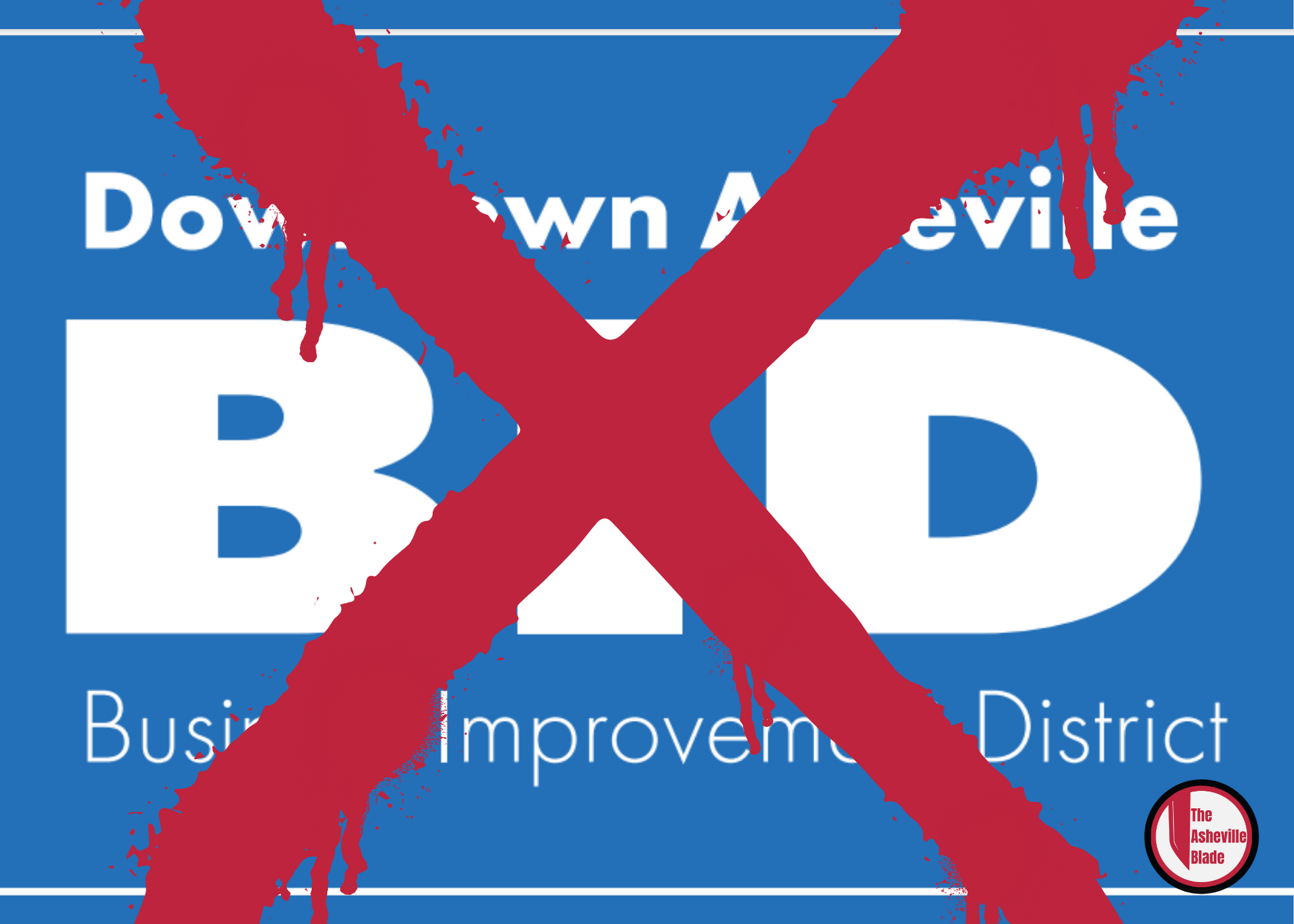
Corruption. Harassment. Surveillance. Business Improvement Districts are gentrification on steroids, with a horrific record around the country. Now one is on its way to Asheville. It must be stopped.
Graphic by Matilda Bliss
If you’ve tuned in to local media or received one of their fliers in your mailbox, you might have heard of the proposed downtown Asheville Business Improvement District.
On that flier sweeping photographs of the city center are paired with photos of smiling BID staffers from other towns, blue cursive font proclaiming: “Elevate our community with clean and safe initiatives.”
The rest of the pitch makes the BID sound like some fairly innocuous measure that might pick up a bit more litter.
In practice BIDs are the knife-edge of gentrification, taxing people throughout an area but giving the funds to an unelected organization directly controlled by the wealthy. Rather than a widely-loved public good they’re the target of community outrage around the country. Over the past decades BIDs have racked up an extensive record of lawsuits for everything from brutal civil rights violations to acting as shadowy slush funds.
Indeed Block by Block, a company that helped craft the Asheville BID proposal, is currently facing a major class action lawsuit alleging widespread breaches of labor law.
Past its slick marketing the actual BID plan pushed by the local Chamber of Commerce and similar groups lays out an organization explicitly dominated by large property owners who will tax the whole neighborhood and hire private security to target anything “deemed out of the ordinary.” With the cooperation of local government they’re looking to push this through Asheville city council by the end of May.
Not shockingly, we’re against that. We know a lot of locals are too. A previous attempt to impose a BID in the early 2010s floundered in the face of public outrage.
But last year’s fearmongering campaign about the homeless went hand in hand with a push from the chamber for BIDs in downtown, West Asheville and the River Arts District. For now they’re just pursuing the downtown one. But if they get it they’re unlikely to stop there.
As we’ve seen from the growing grassroots push to abolish the Tourism Development Authority hotelier cartel, people here are sick of the traditional “Asheville way” of government by the wealthy, for the wealthy that’s made this city one of the least affordable in the country.
Well the BID is the TDA on steroids. With guns. If that sounds like a deeply chilling idea to you, like something people should fight to stop, then read on. Here’s an in-depth look at what BIDs actually are.
What is a Business Improvement District? How would it work in Asheville?
A Business Improvement District (BID) is, on paper, a special tax district. An extra property tax is imposed throughout an area, with the proceeds going, supposedly, to extra services that will be run by a non-profit. Their goals are usually vague ones like “clean and safe.”
But in reality BIDs are something very different. They have an atrocious track record of harassment, rampant corruption, targeting protesters and even driving out smaller businesses.
Even by the usual BID standards, though, the proposed one in downtown Asheville is a particularly blatant power grab. Almost everyone in downtown will pay an additional tax — renters through even higher rents — to fund it..
But the money won’t even go to local government. While state law allows city officials to set up and run their own BIDs, this is one is proposed to go up for, well, bid to a private organization. This is supposed to be an open process but it’s pretty clearly being set up for a front group established by the chamber and the Asheville Downtown Association. Once city council gives them the go-ahead, those two organizations will then choose the BID’s initial governing board in secret, probably with some assistance from similar groups like the far-right Council of Independent Business Owners and the TDA.
That board will be dominated by wealthy property owners. If BIDs in other cities are any guide, many of them probably won’t even live here.
Half of the proposed board’s 14 seats are reserved for those with over $1.5 million in holdings. Of those three will be “major commercial property owners” with over $4 million and two “large commercial property owners” with between $1.5-4 million. The rest of the seats are mostly reserved for businesses, including a spot each for office, retail and restaurant. One seat is reserved for a renter.
The BID proposal also promises “sensitivity to diversity of all kinds.” Based on the above, they mean it will include developers as well as hotel barons.
Importantly the board the chamber and those other groups handpick will then choose its own successors. City council will merely have the option to rubber stamp whatever slate they present. Once in place the BID will have a contract with city hall for the next decade.
Other locals in the neighborhood — and despite runaway gentrification there are still working class folks in downtown — will have to pay them money but have zero say in what happens to it.
The BID effort is marketed as locals “taxing themselves.” This is untrue. The BID doesn’t just apply to a few businesses. Under state law and the proposed district boundaries everyone in the neighborhood — with a handful of exceptions like churches — will pay. The vast majority of people living and working in downtown have no say in its formation or what it does. Many BIDs in North Carolina are, for this reason, drawn to leave out residential units. Asheville’s is not.
If passed in a series of upcoming votes by council, the BID will then operate as a privatized mini-government, extracting $1.25 million a year in taxes.
The BID would also go into effect the same year as another Buncombe County property revaluation and a likely tax hike to pay new bonds local governments want to pass. Given the history of how those tax appraisals are distributed, the burden will disproportionately hit the working and middle class — especially Black locals — while comparatively sparing the wealthy.
Some of the BID’s funds will go to “enhanced cleaning services,” which the proposal defines not just as picking up litter but “removing graffiti, stickers and handbills.”
Mostly, though, they’ll use that cash to hire private security. These will be teams of “ambassadors,” rent-a-cops or even armed contractors whose goal, in the words of the BID proposal, is “to address and/or report any activities deemed out of the ordinary,” deter “unacceptable public behavior” and target “anti-social behaviors and situations.” All as defined by the chamber and other conservative business owners.
So if you’re poor, queer, trans, BIPOC, a busker, a service worker, or really anyone that doesn’t look like they own five houses, the BID poses a very real threat to you. Ever gone to a protest? Distributed mutual aid to your neighbors? Put up a flier for a show? You’re who the BID wants to “clean” out of the core of the city.
Even if one is a bit better off but operates a business or organization that doesn’t strictly cater to the rich, there’s a solid chance the BID will drive you out in the coming years.
This is not speculation. BIDs have, over the past decades, faced a barrage of civil rights lawsuits around the country for everything from illegal surveillance to outright assault. They favor big business and corporations so consistently that studies by urban planners conclude that driving pretty much everyone else out is their likely result.
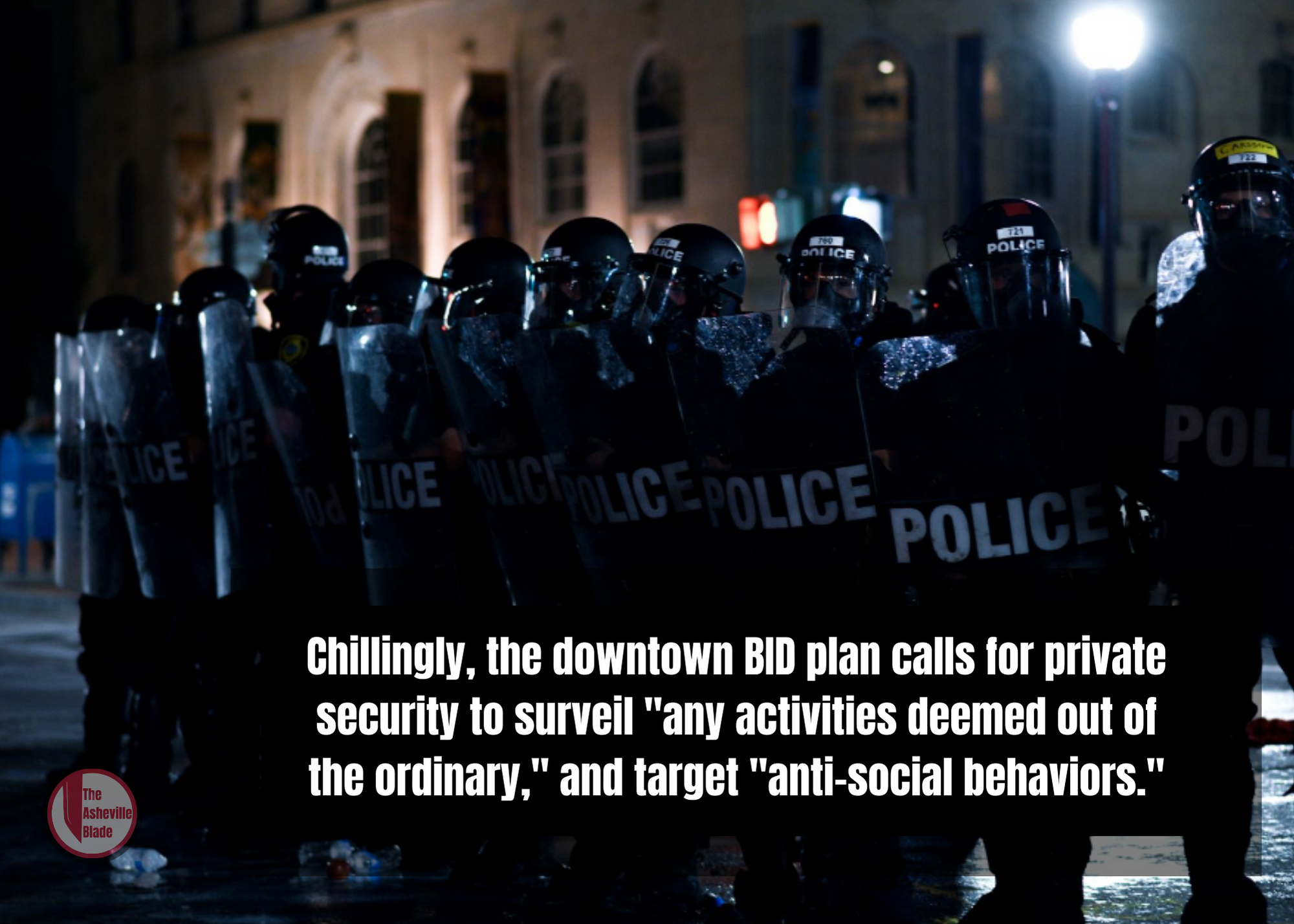
Graphic by Matilda Bliss. Background photo of riot cops deployed against anti-racist protesters in summer 2020
Even audits by some local governments have found that BIDs often act with no real oversight and are a recipe for extensive corruption.
Oh, on top of everything else once the BID is in place city hall will pay the Chamber of Commerce — a famously cash-strapped organization — $200,000 to reimburse them for imposing this on the public.
It isn’t inevitable, it can be stopped, but that’s what the BID would be.
Wow. Seriously?
Yes. It sounds like something out of a dystopian sci-fi novel. But the above is what the downtown Asheville BID proposal actually says — minus the marketing jargon — combined with information from the many articles, studies and, well, lawsuits documenting the impact of BIDs around the country.
Since there are BIDs around the country, what’s their track record?
The flier sent out by the BID backers claim that they’re a “national best practice in downtown cleanliness, safety and economic viability.”
To say this is untrue would be a massive understatement. BIDs date back to the 1970s, so there’s been plenty of time to see how they work on the ground. They’re not some universally-adored organization. In recent years even centrist urban planners have cautioned against the damage they can inflict.
Heads-up: there’s a lot of information in this section because BIDs have a very long and awful track record. If you want to go directly to some ways you can help stop this, there’s a “How can locals fight this?” section at the end of the piece.
A 2016 article in The New Republic, hardly a radical publication, is bluntly titled “Business Improvement Districts Ruin Neighborhoods.”
“Business Improvement Districts are a favored neoliberal practice that transforms mixed-income neighborhoods into the same chain stores one can find at any outlet mall around the country,” the piece summarizes. “BIDs can hire its own security to patrol an area, effectively control who is offered retail space, kick out street vendors and influence legislation and expansion efforts.”
A 2013 study by Columbia University professor Stacey Sutton on the impact of BIDs in New York City, which has the most in the country, concluded they actually had a negative impact on neighborhoods with small and independent businesses.
“In areas of greater growth in independent businesses, both sales and employment decline significantly. All of this suggests that policy makers should tread lightly when promoting BIDs as a solution for urban economic development, especially in areas of significant independent retail presence.”
Then there’s the threat BIDS pose to pretty much anyone those running them don’t like. As a 2021 Truthout article detailed, the districts are closely tied with the rise of privatized police forces.
“In practice, this often results in the exclusion and harassment of populations that businesses find ‘undesirable’ — anyone that is perceived as a threat to consumer activity and profit, and especially the unhoused.”
An extensive 2018 study of nearly 70 California BIDs conducted by the UC Berkeley School of Law backs this up, finding that “BID involvement in social services is experienced by homeless people as an additional form of policing, harassment and surveillance.”
“The study found that BIDs use their expanded power and resources to advocate for policies and engage in policing practices aimed at driving homeless people out of their districts,” a summary from the law school reads. “These districts also routinely use their own private security and work closely with local police to enforce anti-homeless laws and otherwise exile homeless people from their boundaries.”
It also concluded that the districts often go a step further, trying to push existing shelters and service providers out of their areas.
Indeed BIDs get sued a lot, especially for the actions of their “ambassadors” and other private security.
In 2001 the Fashion District BID in Los Angeles settled a major lawsuit regarding its pervasive harassment of homeless people. The district’s management agreed, according to the Los Angeles Times, “that its yellow-shirted private security teams will not search, photograph, request identification from or order homeless people to ‘move along’ from public streets.”
Regrettably it didn’t stop there. In 2014 local civic groups sued another Los Angeles BID over regularly destroying houseless people’s tents and belongings.
“The suit said that after courts barred the city from illegally destroying homeless people’s property, it turned to the private officers to confiscate belongings owners temporarily left behind while they used the restroom, got a meal or received medical care,” a Los Angeles Times report reads.
In 2015 the ACLU of Southern California sued the Fashion District BID again, this time on behalf of street vendors “to challenge the unlawful seizure and destruction of their carts, utensils and other property.”
That same year a Berkeley BID “ambassador” brutally assaulted a homeless man — repeatedly punching him in the face — and was only fired after video of the attack sparked public outrage.
In 2019 the Chattanooga NAACP mobilized to stop a proposed BID, calling it “blatantly racist” and likening it to Jim Crow-era governments that reserved power over tax money for a handful of wealthy white property owners.
“We’re not in the business of separating and segregating the city all over again, we’ve fought too hard,” NAACP member George Calhoun told TV reporters at the time. “It takes Chattanooga back so many years.”
Their fears are well-founded, as BIDs also have a record of targeting political organizing they don’t like, especially anti-racist protest.
In 2011 a director of the Downtown Industrial Los Angeles BID had Deborah Burton, a local Black organizer then in her late 60s, arrested and charged with assault for blowing an air horn during a protest of the BID’s crackdowns on the poor. The charges fell apart in court and the BID, police and city government were later sued for harassment and malicious prosecution.
In 2020 the Electronic Frontier Foundation and the ACLU sued a San Francisco BID for helping police circumvent laws against surveilling protesters.
“During the first week of mass demonstrations following the police killing of George Floyd, the SFPD tapped into a network of more than 400 cameras owned by a business improvement district to conduct live mass surveillance of the protests,” an EFF summary of the lawsuit reads. “This surveillance invaded the privacy of the protesters, targeted people of color and chills and deters participation and organizing for future protests.”
This quasi-police state can even extend to what creative expression, if any, is allowed within a BID. In the late ’90s the Seattle Center BID claimed it had the power to regulate the entire area like private property. This included only allowing buskers and artists they authorized and licensed. It took a years-long lawsuit before a federal judge struck down the rules as a blatant violation of the First Amendment.
Then there’s the fact that giving small, unelected groups of wealthy property owners direct control over tax dollars isn’t exactly a recipe for transparency. BIDs have also faced numerous allegations of corruption.
In 2015 an open government group sued San Diego’s BIDs, asserting that in practice they operated as “slush funds” controlled by a handful of larger businesses.
Such problems can also extend to the private companies contracted to operate BIDs. The chamber brought in Block by Block to help design the downtown Asheville district. The company currently faces a massive federal class action lawsuit on behalf of over 2,000 workers alleging it “didn’t pay minimum and overtime wages, deprived them of rest and meal periods and provided inaccurate wage statements.”
An extensive 2020 audit of the BIDs in Portland, Ore., which only took place after public outcry over the Clean and Safe BID’s harassment of protesters and the poor, found that in practice the organization operated without any real oversight on everything from finances to the conduct of its private security.
“The city has failed to conduct even cursory oversight of these districts,” according to a summary of the audit’s findings from Oregon Live. “The result is that people living in and using public spaces in those districts can face unequal treatment because of privately funded security services…and no city officials review if those enhanced security forces are acting within an appropriate scope of duties.”
“The auditors also said that at least two of the districts are largely controlled by property and business owners, so renters have little say in how the [BID] in which they live is controlled.”
For good measure the Portland Business Alliance, that city’s equivalent to the chamber, even siphoned off a chunk of the BID’s tax dollars to directly pay nearly half the salaries of its own top officials and support staff.
There is no reason to think that Asheville’s BID will be any different.
Those pushing Asheville’s BID claim that private security won’t be part of it. Is that true?
No. On one level they’re playing a word game. A BID’s main employees, the “ambassadors,” are marketed as walking around town greeting people, but as many of the above examples show, they act as de facto private security.
Remember the downtown BID proposal’s own words about the purpose of the ambassadors: to target anything “deemed out of the ordinary” and “anti-social” by those controlling the BID.
As Joshua Epstein, a researcher who worked on the Berkeley study, concluded after examining BIDs across California “at times BID law ‘enforcement’ appears untethered from actual law and more resembles harassment.”
On another level they’re just lying. In a March 20 Mountain Xpress article downtown property owner and BID supporter Kim MacQueen outright said that “a BID could decide ‘let’s take a pot of money that we’re not spending and hire a security guard.’”
Once a BID is in place there’s very few real constraints on what they use the money for. That’s going to mean private security aimed squarely at the homeless and anyone else they don’t like.
It’s worth remembering that public records obtained by the Blade revealed that in early 2022, in the wake of the infamous Christmas night crackdown on protesters and journalists, chamber CEO Kit Cramer pressed some local government officials “if folks who are arrested can be banned from certain locations,” according to a text message from Asheville city council member Antanette Mosley.
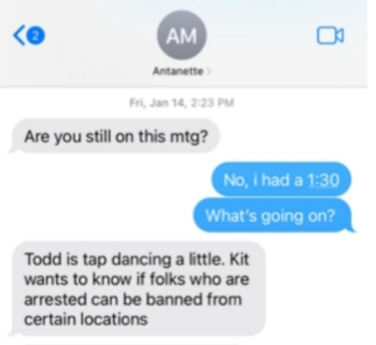
A Jan 14, 2022 text message from council member Antanette Mosley, noting chamber CEO Kit Cramer’s push to ban protesters and mutual aid workers from “certain locations”
Giving what’s basically a front group for her organization $1.25 million in tax dollars and its own private security force isn’t going to improve things.
So the BID is related to the surge of media blaming the homeless for Asheville’s problems?
Very closely, yes. In addition to increasing the police budget, laying the groundwork for a BID was one of main points of those breathless scare stories about homeless people we’ve seen over the past two years.
This is particularly the case with the Asheville Watchdog‘s “Down Town” series, which marked the publication’s turn from some useful investigative journalism to largely echoing conservative talking points. Cramer, the chamber’s CEO, was given a platform in three of the stories — in two of them extensively — without her assertions ever being seriously challenged.
These pieces, in particular those penned by the openly right-wing John Boyle, even ignored Associated Press Style to dub the homeless “vagrants” and imply that “reparations for Blacks” were behind declining numbers of Asheville police.
The series’ initial February 2023 piece, which received the widest distribution, opened with a graphic out of a conservative fever dream, complete with horror movie font and “more vagrants” alongside “drugs, squalor, mental illness.” Its assertion that downtown was “lawless” was mostly based on “feelings” from business owners and tourists that homeless people, visible poverty and less cops automatically made them unsafe. Plenty of the rest was composed of anecdotes about marauding homeless folks told by business owners and presented by the Watchdog without serious examination.
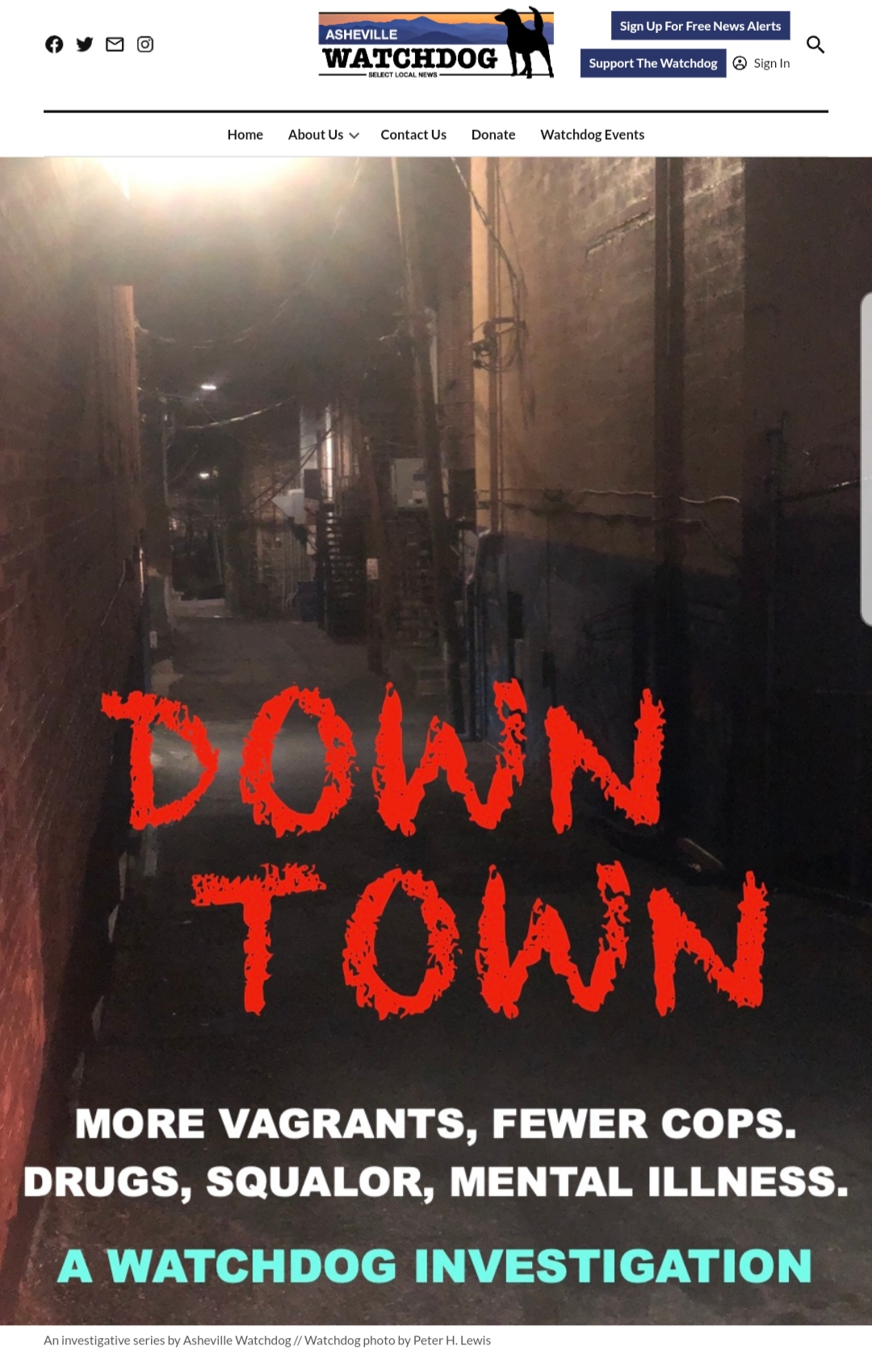
The original headline graphic for the Asheville Watchdog‘s “Down Town” series, which targeted the homeless and openly echoed chamber talking points. From the Internet Archive
There were some nods later in the series towards the hardships faced by the poor, but overwhelmingly it portrayed the unhoused as a danger and more police and jails as the solution.
The chamber had already started work on the push for BIDs throughout Asheville (they’d eventually focus on downtown) in January 2023, including hiring a consulting firm and reaching out to “stakeholders.”
The highly publicized “community listening session” almost immediately after the Watchdog series’ debut was organized by the chamber and the TDA.
Indeed an entire article in the series was devoted to the chamber’s talking points supporting a BID, presented without serious challenge.
That piece, written by Boyle, contained key inaccuracies. It asserted that downtown broadly supported the previous 2010s BID while a survey at the time showed even property owners overwhelmingly against it. It portrayed that era’s Asheville as struggling with crime when rates were fairly low and even business organizations rated concerns like parking a higher priority. Boyle also didn’t bother to seek comment from any of the many opponents of the previous BID while ignoring the controversies and lawsuits over the actions of similar institutions around the country.
If one wonders why we at the Blade regard establishment media’s claims to “objectivity” as a joke, the above is a perfect example.
In a Dec. 27 column Watchdog co-founder Sally Kestin wrote that the origins of the series lay in emergency sirens, and a restaurant owner complaining about the homeless, interrupting her dinner in downtown.
“This was not the downtown Asheville we’d come to know and love, the city center bustling with carefree locals and tourists feeling safe to explore its renowned arts, dining and cultural scenes.”
Apparently Kestin, who came here from Florida and settled into a $1.1 million home in North Asheville in 2020, believed she was moving to a marketing brochure, not a city.
“Longtime business owners and employees were calling it quits, we reported. Out-of-town tourists dubbed the city ‘Trashville,’ some vowing never to return.”
How terrible.
In that column Kestin specifically named the chamber’s push for a Business Improvement District, “an old idea that was gaining new traction to improve conditions downtown” as one possible “solution” the series was meant to platform.
Of those quoted in the series’ first piece, co-written by Boyle and Kestin, at least 18 were business owners, high-level managers, heads of major business organizations or property owners. Only three, possibly four, weren’t.
This fearmongering helped create a handy excuse for the BID, the impression that there were widespread “community concerns” about the homeless making downtown unsafe. That gave political cover for city hall and groups like the chamber to rush through a deeply unpopular idea they’d wanted to revive for years. This “concerned citizens” tactic was not a new one from Asheville’s gentry, but now it was pushed with a far larger media blitz.
The Watchdog‘s series has not aged well. They quietly pulled down the scare graphic on the initial piece, replaced it with a basic photo of Pritchard Park and added an editor’s note mentioning revisions “to conform with the Associated Press Stylebook’s guidelines for describing people who are experiencing homelessness.”
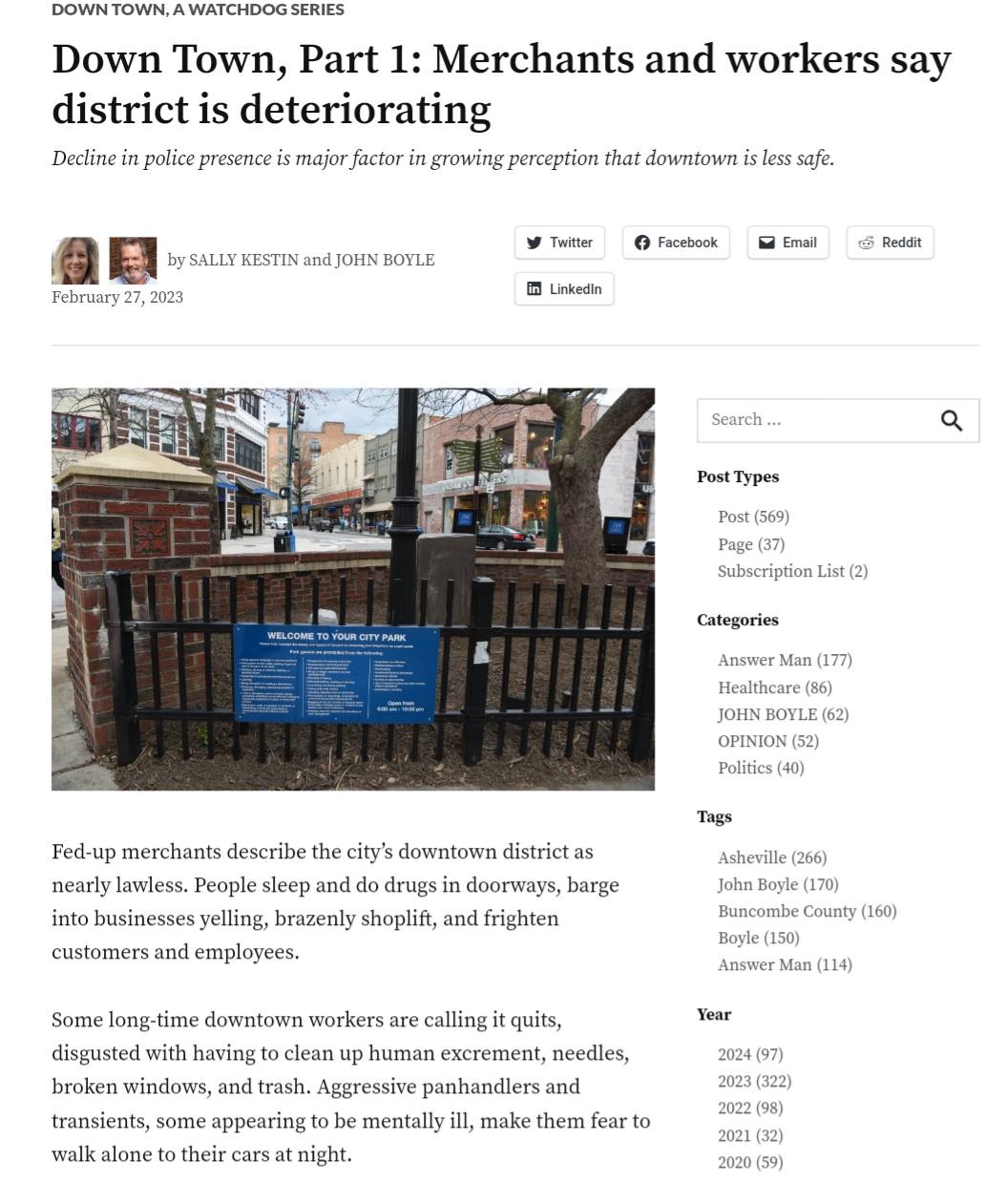
The revised first part of the Watchdog‘s “Down Town” series, with the previous horror movie font and the subhead calling the homeless “vagrants” removed
As this year opened even other establishment media, like the Citizen-Times, started to puncture holes in the myth of an unsafe downtown, highlighting that the neighborhood sees little violence compared to other areas of the city. One reason those pushing the BID are eager to get it approved as quickly as possible is because the excuses engineered to justify it are falling apart.
How was the 2010s push for a BID stopped?
Because damn near everyone hated it and the more they found out about it, the more they hated it.
I covered the fight over the first BID extensively for the Xpress. Local anarchists organized and pushed back against the BID early and ferociously. The Firestorm Co-op, then located downtown, pushed back with statements like “our community is not a mall” that drew wider attention to the issue. As word spread a wide coalition — everyone from hotel owners to homeless service organizations — formed against it. The reasons for the opposition ranged from not wanting to pay the extra tax to clearly seeing the threat of privatized police.
In 2012 city council approved the formation of the BID, but wanted to directly appoint half the board and for the district to include no “ambassadors” or other private security. They also held off on approving the tax that would fund it.
At that point sheer gentry arrogance helped wreck it further. Council asked for minimal transparency as a sop to growing public outrage and the BID board reacted with extended tirades during a March 2013 meeting. MacQueen, the same property owner who’s now eager to hire private security, compared city officials to an abusive spouse for wanting to know where the tax dollars would go. The organization quietly folded the next year.
Basically: BIDs don’t do well in the spotlight, facing determined opposition.
But city hall, the chamber and others among the gentry never really gave up the idea. In 2019 two Asheville city council members went to Portland, Maine to review their BID. In February 2020 the planning department slipped it into their list of goals for the upcoming year.
The outbreak of the pandemic and the wave of street demonstrations starting in summer 2020 threw a wrench into these plans. Also, as public outrage against the TDA grew, the idea of handing more cash to another unelected board became more politically toxic.
There’s a reason that this time those backing the BID preceded it with an extensive propaganda campaign and are trying to rush it through local government at breakneck speed.
Besides the chamber, who’ pushing this?
It’s worth reviewing who, besides chamber executives, presented the formal BID proposal at the last Asheville city council meeting.
For the Downtown Association there was corporate attorney Beth Lane, president of its board and board member Bill Durr, an attorney whose practice includes “representation of professional athletes and other high net worth individuals in a variety of family law matters.”
On the business side there was Larry Crosby, general manager of the high-end Foundry Hotel, Eva Michelle Spicer, one of the owners of Spicer Greene Jewelers and Biltmore Company Vice President Tim Rosebrock.
The salt of the earth this ain’t. Those pushing the BID aren’t just business and property owners but often the upper crust among them.
Indeed BIDs abandon even the facades of “one person, one vote” and “no taxation without representation.” The idea that the wealthy should have direct control over tax money and choose their own successors was considered ultra-conservative all the way back in the 19th century. But here we are.
The actual problems facing Asheville, including its downtown, instead come from decades of catering to business at the cost of everything else.
The chamber wants more cops, so money’s poured there instead of housing or the faltering transit system. Business gets a massive discount to water rates for nearly 20 years while locals get gouged. So the system repeatedly breaks down. Airbnb landlords want more money, so city hall basically stops enforcement and rewrites the rules to make it easier to kick out tenants in favor of tourists. The housing crisis gets even worse. Covid safety is ditched to appease the tourism industry, so our area has unusually bad covid waves, with the ensuing illness and deaths. Council opens the floodgates on hotels, so they drive up rents and drive out spots used by locals.
Many of these actions were pitched as helping the ever-mythologized “small business.” But in practice such policies always subsidize big business, hiding behind the “mom and pop” shops the same way airbnb companies hide behind a few residents renting out extra rooms.
The BID is no different.
So it’s worth mentioning who isn’t backing this.
According to the BID effort’s own numbers, just four percent of its survey responses came from renters downtown. While 29 percent came from downtown employees, it’s worth keeping in mind that this also includes high-level managers and plenty of well-off individuals like realtors, attorneys and architects. Waiters and line cooks aren’t the ones clamoring to give the chamber of commerce more power.
More perspective comes from Lisa, a local who’s worked downtown for over a decade and was recently interviewed by the Blade. She asked her last name not be used due to the possibility of retaliation for speaking up about the realities of gentrification.
“Downtown has become less a resource for its citizens and more a playground for its visitors,” she tells the Blade. “We’re losing businesses that serve us. I used to be able to go downtown to run errands, to do the things I need to do in my daily life. That keeps getting pushed out further and further.”
But this is, she emphasizes, “100 percent” due to the tourism industry and gentrification, not the homeless. “We face a resource problem, not a violence problem.”
Indeed Lisa says that tourists pose a far worse threat to her safety and those of her co-workers than the homeless.
“We’ll get harassed by college boys and drunk tourists on the streets, who don’t live here but think that because of the way Asheville is portrayed as a playground for them that they can treat the residents however they want.” she says. “Having worked in food service, they treat the workers horribly.”
Not surprisingly, Lisa has never seen police intervene to stop such harassment, even when it’s happening right in front of them.
“We’re being conditioned to feel like we don’t matter, our opinions don’t matter, we’re just here to serve everyone else. That’s not being accepted very well,” she says of locals’ anger at gentrification, including measures like the BID. “I have friends who say ‘it’s illegal to be downtown if you don’t have any money.’”
That honestly aligns really well with what I’ve seen living and working downtown for the better part of 20 years. In that time I’ve had just a handful of tense interactions with homeless folks. Meanwhile tourists have shouted slurs at me, tried to assault me and — more than once — deliberately tried to run me and other pedestrians over while we were crossing the street.
Not only will the BID not do anything about that, it will make all of it much worse.
When is city council going to vote on this? Does it look likely to pass?
There will be a public hearing at city council’s April 23 meeting, with votes on the BID — it requires two readings — at the ensuing council meetings on May 14 and 28.
That said, the chamber’s lobbied city hall pretty hard, including “3 on 3 meetings” between the organization’s higher-ups and the maximum number of council members allowed to be in the same room without it legally becoming an open government meeting. Mayor Esther Manheimer and city council are putting their hands on the scales pretty damn hard to rush through its passage.
Unusually the April 23 meeting will start at 4 p.m. in the civic center ballroom instead of its usual 5 p.m. time in city hall. The BID is, as it stands, is scheduled as the last public hearing on a packed agenda.
Given that city council goes through speakers at its public comment periods on a “first come, first serve” basis of who signs up at the meeting, this favors the well-off BID supporters. They have the spare time to show up before most locals get off work and then sit through hours of city council proceedings. This is a tactic city hall’s used before when they’re pushing through something they know a lot of people won’t like.
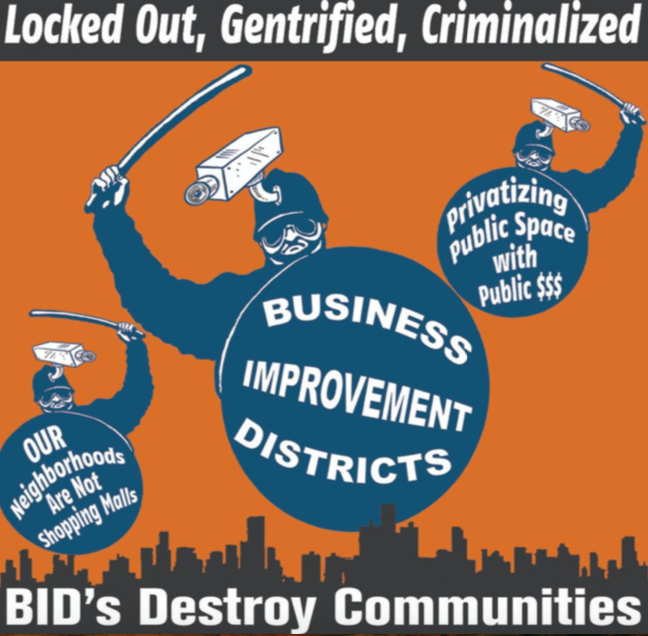
Anti-BID art from the community struggle against Portland’s notorious “Clean and Safe” BID. From KaitlynDey’s “Business Improvement Districts and Enhanced Service Districts” published by Portland State University, 2019
According to a source familiar with city hall’s process, they’re going even farther to shut out those opposing the BID. Council is set to limit the April 23 public hearing to a single hour — almost unheard of for a major issue like this — which makes it easy for the chamber and similar groups to pack in early and take up the whole time before those opposing them gets to speak.
So far no sitting member of council actively opposes the BID. Ostensible dissenter Kim Roney says she’s open to the idea in exchange for a small community paramedic program. Sadly, city council candidates in the current race aren’t any better. As it stands none of them seem to even question the chamber basically dictating policy for the entire city.
City hall’s trying to rush the BID through as quickly as possible so opposition doesn’t build like it did back in the 2010s. While small improvements to transit or even minimal reparations languish for years, council works with lightning speed to appease the wealthy.
How can locals fight this?
With determination and, as always, a willingness to remember that struggles don’t end at city hall.
Even there the seemingly universal support for the BID may not be set in stone. At the last meeting several council members all but admitted that the proposal, especially the board dominated by the wealthy, was not particularly popular. Similarly, if public opposition to the BID grows, some candidates may change their positions, even if just to get votes.
With that in mind it is worth phone zapping them. Especially during dinner. Remember that anger works far more effectively than being nice.
You can call them directly here:
Esther Manheimer (mayor) 828-231-8016
Sandra Kilgore (vice mayor) 954-540-5593
Sage Turner 828-216-9284
Maggie Ullman 828-713-9488
Antanette Mosley 404-395-3665
Sheneika Smith 704-401-9104
Kim Roney 828-450-1099
That said, don’t put your trust in politicians. Especially in Asheville.
The BID’s biggest weakness remains that the more people learn about it the more they oppose it. During the last council meeting Roney even noted that “another unelected board overseeing public tax dollars is giving people an allergic response.”
As bad as it is that other unelected cartel, the TDA, doesn’t have the power to raise your rent then have you arrested for looking too poor or “out of the ordinary.”
Remember that the BID was supposed to be inevitable the last time around too, right up until it wasn’t. One of the first tactics those in power deploy is the illusion that their goals are already set in stone. Determined defiance can change that.
So anything that makes their push to impose this on the public as painful and prolonged as possible is a good idea. The public outrage that stopped city hall’s push to ban giving food and cash to those in need in 2022 and 2023 offers a useful reminder that local government can back off pretty quickly if they face an uncompromising public.
If the BID passes, efforts will have to turn to making it basically impossible for it to operate through lawsuits, demonstrations and whatever other methods communities decide to use. This is not impossible. One reason the gentry are pushing the BID is the lasting losses to the APD from so many of their cops leaving in the face of public anger. If working for the BID gets one as widely despised as working for the APD then there’s decent odds it folds.
And the BID must be stopped. Not modified, not made slightly more representative. Ended. This is a blatant power grab by the wealthy that will make things far, far worse for everyone else. The only proper response is to bury it.
—
Blade editor David Forbes is an Asheville journalist with over 18 years experience. She writes about history, life and, of course, fighting city hall. They live in downtown, where they drink too much tea and scheme for anarchy.
The Asheville Blade is entirely funded by our readers. If you like what we do, donate directly to us on Patreon or make a one-time gift to support our work. Questions? Comments? Email us.